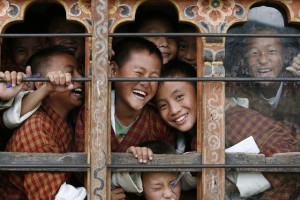Across countries, the term varies: happiness, well-being, welfare, quality of life. But decades after the king of Bhutan first proposed the concept of measuring Gross National Happiness, more and more countries are realising the value of paying attention to happiness alongside the traditional metric of economic growth.
Venezuela has a Ministry of Supreme Social Happiness. In Canada, a team of researchers compiles and publishes an index of well-being. The government of Israel measures a host of “well-being indicators,” as do France and the United Kingdom.
France, the United Kingdom, and Israel all measure a series of “well-being” indicators, while Venezuela has – in a similar move to the UAE – established a minister devoted to happiness.
And the United States, which enshrined the “pursuit of happiness” in its Declaration of Independence, has begun to compile a national index of happiness.
These purpose behind these initiatives, says Margo Hilbrecht, the associate director of research for the Canadian Index of Wellbeing (CIW), echo lines from a speech made by Robert F Kennedy, in 1968.
“The gross national product does not allow for the health of our children, the quality of their education or the joy of their play,” said Kennedy, then the US Attorney General.
“It does not include the beauty of our poetry or the strength of our marriages, the intelligence of our public debate or the integrity of our public officials … It measures everything in short, except that which makes life worthwhile.”
A similar idea had begun to brew in Bhutan in the 1960s, said PP Karan, a geography professor at the University of Kentucky.
Karan, who was conducting his field research in Bhutan during that decade, says that in his meetings with the then-king, Jigme Dorji Wangchuck, “he talked about measuring the development level and well-being of a country based on the happiness of its citizens.”
But Bhutan only computed its first happiness index in 2010, trying to measure parameters such as education, ecology, community vitality, health and time use.
In 2015, surveyors from the Centre for Bhutan Studies polled 7,135 citizens on 33 subjects.
Respondents in two-thirds of these domains were classified as “extensively happy”.
“Bhutanese officials note that the happiness index is about finding a balance between modernity and tradition, between prosperity and ecological conservation, between material advancement and discontents,” Karan says.
The central questions behind happiness indexes have always been philosophical in nature: what is happiness, and how can such an abstract concept be measured by data?
Hilbrecht prefers the term well-being. Happiness can be too dependent on an individual’s psychological traits, she says: “Well-being is easier to measure objectively.”
By measuring well-being, CIW – which is independent of the government – hopes that it can provide parameters for ministries to consult while designing policies.
At the University of Waterloo, where CIW has been housed since its establishment in 1999, researchers first conducted extensive focus groups to learn what matters to Canadians and their idea of a good life.
This information was then distilled into a set of eight domains: community vitality, democratic engagement, education, environment, healthy populations, living standards, time use and leisure and culture.
Then researchers worked out a set of eight numerical indicators to track in each of these domains, using data published by the government or other agencies.
Two indexes have been published, the first in 2011, based on data from 2008, and the second in 2012, based on data from 2010. A third will be published this year.
Hilbrecht says she and her team have been able to draw valuable conclusions between the first two sets of data.
“The effect of the recession was evident from the first index to the second,” she says. “By 2010, the economy was recovering, but the index showed that there was a lag in well-being.”
Canadians are also dissatisfied with the quality of their leisure time: “People are visiting national parks less often. The average number of vacation nights per trip has decreased since 1994. This affects their overall health and the pressure they feel on their time.”
Dr Hilbrecht cautions that the pace of social change is slow. In fields like education and health, new government policies begin to have an impact many years after they are first implemented.
She also says that CIW tweaks the index constantly, based on feedback, to reflect Canadians’ changing perceptions of well-being.
“We now include food security as one of the indicators, for instance, because we had a lot of input about that,” Dr Hilbrecht says. “We see happiness itself as different for different communities, and we see our index as a living, changing thing.”
Source: Samanth Subramanian| The National

